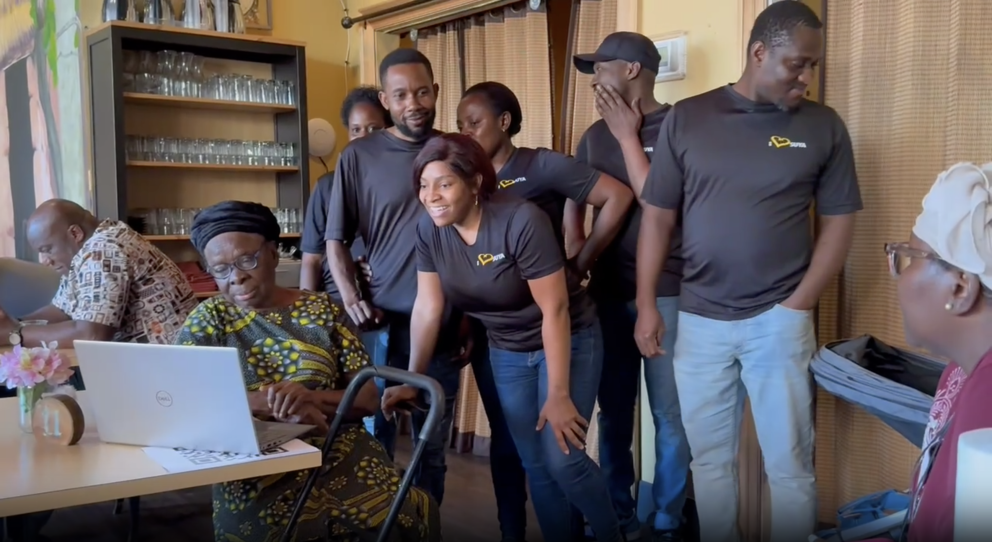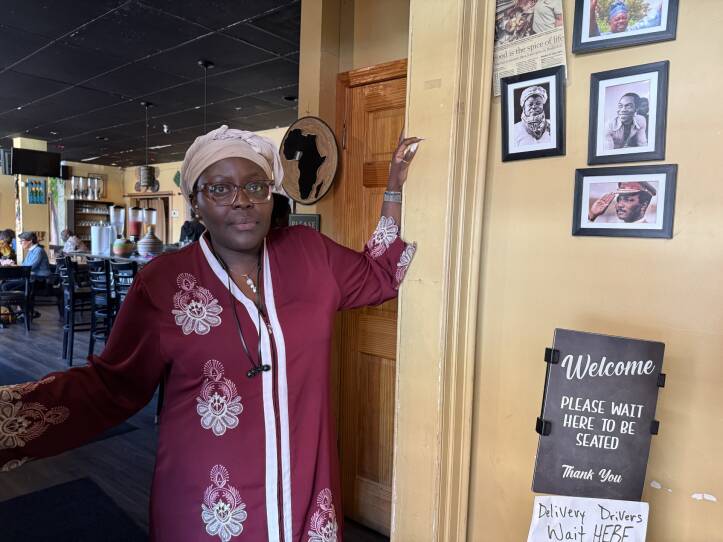An immigration judge ruled on Tuesday that Paul Dama is eligible for asylum and can remain in the United States, potentially clearing the way for his release from federal custody.
Dama has been held at a U.S. Immigration and Customs Enforcement facility in New Hampshire since his arrest more than three months ago. He appeared in court via video, telling Judge Yul-Mi Cho that “going back to Nigeria would be like a death sentence to me.”
He described his captivity and torture in 2018 at the hands of Boko Haram, a Muslim militant group in northeast Nigeria that the U.S. designates as a terrorist organization. Dama said local police did nothing to protect him as a journalist for the state-owned Nigerian Television Authority, and that after his family paid for his ransom, he’s continued to receive threats.
“I was mentally and psychologically damaged,” he said. “I had nightmares. … It felt like I was being watched, like I was being followed around. I didn’t feel safe. I came here to have a normal life.”
In the U.S., Dama became the manager at the award-winning West African restaurant Suya Joint, run by his sister Cecelia Lizotte, with locations in Boston and Providence. He also works in residential home care.
He is married to a U.S. citizen and was beginning the process of applying for a green card, and had his asylum application pending when he was detained by ICE in June.
To gain asylum, immigrants have to provide credible testimony and evidence of a well-founded fear of persecution in their home country on account of their race, nationality, religion, social group or political opinion. Evidence of harm includes medical records, personal messages, witness statements and personal documentation. They have to be physically in the U.S. to apply.
Judge Cho said Dama met the standards for asylum. She noted the evidence regarding his work as a reporter, advocacy fighting for a “free Nigerian society,” and past harms he experienced. Cho said he’s done the “work of searching and diving into his own past traumas to improve and come from under those haunting memories in his life.”
“For the foregoing reasons, the court finds that the respondent has met his burden of establishing a well-founded future persecution on account of his political activism and that he has demonstrated his eligibility for asylum as a matter of discretion,” Cho said.
Cho has served as an immigration judge since 2023. In the past two years, she granted asylum or other relief in just 18% of the cases she’s heard, according to the nonprofit data research center TRAC. During the same time period, immigration judges nationwide approved asylum or other relief in about 42% of cases.
Case history
Dama was on his way to church on June 15 when he was stopped by ICE and taken into custody.

Federal immigration authorities told GBH News in June that they arrested Dama because he had been living in the country illegally since his visitor visa expired in 2019 and had two OUI convictions from 2024.
“He had two prior OUIs, and the judge has discretion in this kind of cases — either to deny or grant asylum,” said Dama’s attorney, Abeba Attles, in a phone interview. “But today, the judge used her discretion and granted him asylum. And also, she recognized the effort that Paul Dama has made.”
During the hearing, Dama described the death of his mother in Nigeria, and being unable to see her due to persecution there. When she died, he started drinking to cope with the depression. For both OUIs, he was found asleep in his car on the side of the road. He told Cho that he stayed in his car because he didn’t want to drive and injure anyone.
Dama also recounted getting therapy for PTSD after the OUIs at High Point Treatment Center, which he said he did of his own volition, and not court mandated.
“I learned how to identify stress, how to identify of dealing with my trauma and my triggers, taught me to develop new hobbies and new habits, taught me abstinence.” He said that in Nigeria, “when things like that happen, we pray,” but that therapy had given him coping tools.
Dama was still completing a one-year probation related to his second OUI when he was detained.
Cho said the work Dama had done to address his underlying causes of alcoholism was something he had “clearly demonstrated,” and that he “has made a personal commitment to himself, his family, and his community to abstain from alcohol for life, and that he would engage in AA and a psychotherapist.”

Dama’s sister, Cecelia Lizotte, attended the hearing remotely.
“I am ecstatic, I am crying,” Lizotte told GBH News after the hearing. “He spoke his story. He explained exactly what he went through and what he would continue to do if granted asylum in the United States.”
She believes Cho heard and understood the “past trauma” he endured.
It is unclear if Dama will be released from immigration detention. Dama was initially denied release back in July, but his asylum case is separate from his deportation one. The federal government has the right to appeal the asylum case until Oct. 23, but hasn’t indicated if it will.
Lizotte is hoping he can be released as soon as possible.





